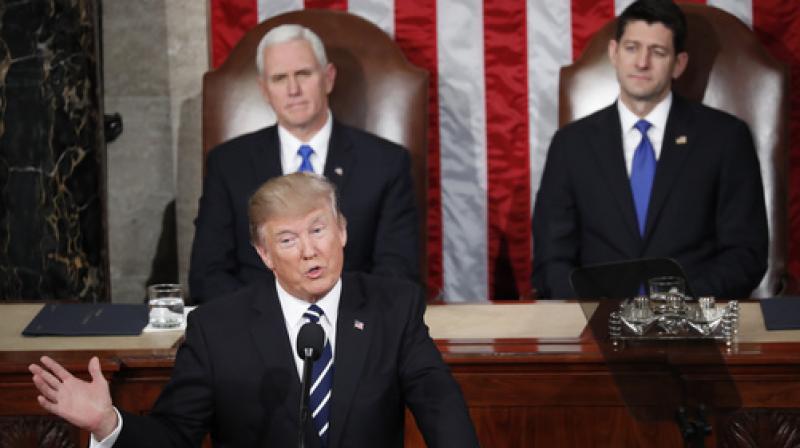Donald Trump hails 'new national pride', lays out agenda for America

Washington: President Donald Trump hailed the emergence of a "new national pride" in his maiden speech to Congress on Tuesday, pushing for tough immigration enforcement as the key to delivering jobs and security at home.
During a turbulent first 40 days in office, the new US president has doubled down on his vow to put "America First" but has yet to translate his populist vision into legislative reality.
But he came to Capitol Hill on Tuesday hailing a "new national pride" and daring lawmakers to rally behind his plans to dramatically slash government spending, industrial regulation and tax.
"A new chapter of American greatness is now beginning," he declared, after arriving to cheers and wild acclaim from members of the Republican-led House of Representatives and Senate.
"A new national pride is sweeping across our Nation. And a new surge of optimism is placing impossible dreams firmly within our grasp," he said, promising to save billions of dollars by enforcing immigration law.
"We must restore integrity and the rule of law at our borders," Trump declared, promising to build a "great, great wall" on America's southern border with Mexico.
Trump touted tougher immigration enforcement as the keystone of a drive to boost American employment and wages, and slash crime.
But he also vowed to introduce a new merit-based immigration system to regulate new arrivals in the United States and reduce the flow of unskilled workers.
Trump said an Australian-style immigration system would "save countless dollars, raise workers' wages, and help struggling families, including immigrant families enter the middle class."
Massive' tax relief
In Trump's longest speech to date as president he remained on message, reading his planned address almost verbatim.
Pressing his domestic agenda, Trump promised to provide "massive" tax relief for the American middle class and to repeal his predecessor's landmark Obamacare health reform, which expanded coverage to 20 million people.
The billionaire's populist message on the economy was equally crucial in his November victory over Democrat Hillary Clinton -- helping him sway voters in crucial Rust Belt states Michigan, Ohio and Pennsylvania. Now his challenge is translating that into tangible policy steps and legislative achievements.
But his White House honeymoon was short-lived, with infighting and inexperience dogging the new administration and confusing signals being sent from the president himself.
Around 44 percent of Americans think Trump is doing a good job, according to the RealClearPolitics poll average, a historic low for modern presidents after a month in office.
Trump hoped to use the pomp and tradition-filled occasion to reconnect with blue collar voters, including touting his willingness to tear up trade deals that he says are bad for American workers.
Many were looking beyond the rhetoric to Trump's plans for rebuilding America's creaking infrastructure and for high-stakes tax and healthcare reform.
On all three issues, Trump faces a difficult balancing act with fellow Republicans, who control both the Senate and House of Representatives.
To succeed, Trump, the consummate political outsider may have to embrace Washington deal-making.
Party pragmatists
Repealing and replacing Obamacare has been a Republican rallying cry for years, but there is still no clear plan in place to proceed.
In a blunt admission Tuesday, the Senate's top Republican acknowledged that the White House and Congress remained at odds over healthcare.
"We're not there yet," Mitch McConnell told reporters.
Conservatives are desperate to pull Obamacare out by its roots, but party pragmatists are wary of dismantling a system that helped some 20 million Americans obtain health insurance.
Tensions between the executive branch and the Republican-led Congress are also simmering over Trump's 2018 budget proposal.
Trump wants to hike defense spending by $54 billion, offsetting with cuts in foreign assistance and other non-military spending.
Some Republicans including McConnell have already bristled at reports that Trump wants to slash State Department funding by more than a third.
Trump may also struggle to balance his defense surge with a pledge to protect Social Security without worsening the country's $20 trillion national debt.

